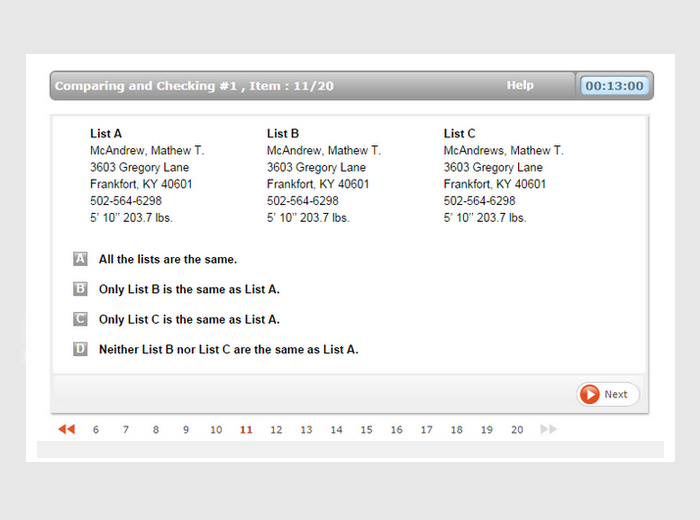Department Analyst Study Guide
Multiple-Choice Test Preparation Manual. City & County of San Francisco. Department of Human Resources. SEARCH; MENU.
Please enable javascript to play this video. Quick Facts: Management Analysts $82,450 per year $39.64 per hour Bachelor's degree Less than 5 years None 806,400 14% (Faster than average) 115,200 Management analysts, often called management consultants, propose ways to improve an organization’s efficiency. They advise managers on how to make organizations more profitable through reduced costs and increased revenues. Management analysts travel frequently to meet with clients. In 2016, about 1 in 4 worked more than 40 hours per week. Most management analysts have at least a bachelor’s degree. The Certified Management Consultant (CMC) designation may improve job prospects.
The median annual wage for management analysts was $82,450 in May 2017. Employment of management analysts is projected to grow 14 percent from 2016 to 2026, faster than the average for all occupations. Demand for the services of these workers should grow as organizations continue to seek ways to improve efficiency and control costs.
Explore resources for employment and wages by state and area for management analysts. Compare the job duties, education, job growth, and pay of management analysts with similar occupations. Learn more about management analysts by visiting additional resources, including O.NET, a source on key characteristics of workers and occupations.
Although some management analysts work for the company that they are analyzing, most work as consultants on a contractual basis. Management analysts, often called management consultants, propose ways to improve an organization’s efficiency.
Department Analyst Study Guide Pdf
They advise managers on how to make organizations more profitable through reduced costs and increased revenues. Because they must spend a significant portion of their time with clients, analysts travel frequently. Management analysts held about 806,400 jobs in 2016. The largest employers of management analysts were as follows: Professional, scientific, and technical services 30% Self-employed workers 17 Government 17 Finance and insurance 11 Management of companies and enterprises 5 Management analysts usually divide their time between their offices and the client’s site. Because they must spend a significant amount of time with clients, analysts travel frequently. Analysts may experience stress when trying to meet a client’s demands, often on a tight schedule.
Work Schedules Analysts often work many hours under tight deadlines. In 2016, about 1 in 4 worked more than 40 hours per week. A bachelor’s degree is the typical entry-level requirement for obtaining a management analyst position. Most management analysts have at least a bachelor’s degree.
The Certified Management Consultant (CMC) designation may improve job prospects. Education A bachelor’s degree is the typical entry-level requirement for management analysts. However, some employers prefer to hire candidates who have a master’s degree in business administration (MBA). Few colleges and universities offer formal programs in management consulting. However, many fields of study provide a suitable education because of the range of areas that management analysts address. Common fields of study include business, management, economics, accounting, finance, marketing, psychology, and computer and information science. Licenses, Certifications, and Registrations (IMC USA) offers the Certified Management Consultant (CMC) designation to those who meet minimum levels of education and experience, submit client reviews, and pass an interview and exam covering the IMC USA’s code of ethics.
Management consultants with a CMC designation must be recertified every 3 years. Management analysts are not required to get certification, but it may give jobseekers a competitive advantage.
Work Experience in a Related Occupation Many analysts enter the occupation with several years of work experience. Organizations that specialize in certain fields typically try to hire candidates who have experience in those areas.
Department Analyst Study Guide Pdf Free Download
Consulting is a wide field, and there are consultants who specialize in virtually every sector of the economy. Therefore, work experience varies widely and can include experience as an,. Advancement As consultants gain experience, they often take on more responsibility. At the senior level, consultants may supervise teams working on more complex projects and become more involved in seeking out new business. Those with exceptional skills may eventually become partners in their consulting organization and focus on attracting new clients and bringing in revenue. Senior consultants who leave their consulting company often move to senior management positions at non-consulting organizations. Important Qualities Analytical skills.
Management analysts must be able to interpret a wide range of information and use their findings to make proposals. Communication skills. Management analysts must be able to communicate clearly and precisely in both writing and speaking.
Successful analysts also need good listening skills to understand the organization’s problems and propose appropriate solutions. Interpersonal skills. Management analysts must work with managers and other employees of the organizations where they provide consulting services. They should work as a team toward achieving the organization’s goals. Problem-solving skills.
Management analysts must be able to think creatively to solve clients’ problems. Although some aspects of different clients’ problems may be similar, each situation is likely to present unique challenges for the analyst to solve. Time-management skills.
Management analysts often work under tight deadlines and must use their time efficiently to complete projects on time. Note: All Occupations includes all occupations in the U.S. Bureau of Labor Statistics, Occupational Employment Statistics The median annual wage for management analysts was $82,450 in May 2017. The median wage is the wage at which half the workers in an occupation earned more than that amount and half earned less.
The lowest 10 percent earned less than $47,140, and the highest 10 percent earned more than $152,210. In May 2017, the median annual wages for management analysts in the top industries in which they worked were as follows: Professional, scientific, and technical services $87,840 Management of companies and enterprises 82,970 Finance and insurance 81,740 Government 78,190 Management analysts working for consulting firms are usually paid a base salary in addition to a year-end bonus.
Self-employed analysts are paid directly by their clients, typically either by the hour, or per project. Analysts often work many hours under tight deadlines. In 2016, about 1 in 4 worked more than 40 hours per week. Note: All Occupations includes all occupations in the U.S. Bureau of Labor Statistics, Employment Projections program Employment of management analysts is projected to grow 14 percent from 2016 to 2026, faster than the average for all occupations. Demand for consulting services is expected to grow as organizations seek ways to improve efficiency and control costs. As markets become more competitive, firms will need to use resources more efficiently.
Demand for management analysts is expected to be strong in healthcare. This industry segment is experiencing higher costs in part because of an aging population. In addition, more management analysts may be needed to help navigate the regulatory environment within health insurance. Information technology (IT) consultants are also expected to see high demand.

Businesses will seek out consulting firms to help them attain a high level of cyber security, and make sure their IT systems are efficient and up to date. Growth will be particularly strong in smaller consulting companies that specialize in specific industries or types of business function, such as information technology or human resources. Government agencies will also seek the services of management analysts as they look for ways to reduce spending and improve efficiency. Job Prospects Jobseekers may face strong competition for management analyst positions because the high earning potential in this occupation makes it attractive to many jobseekers. Job opportunities are expected to be best for those who have a graduate degree or a certification, specialized expertise, fluency in a foreign language, or a talent for sales and public relations. Employment projections data for management analysts, 2016-26 Occupational Title SOC Code Employment, 2016 Projected Employment, 2026 Change, 2016-26 Employment by Industry Percent Numeric SOURCE: U.S. Bureau of Labor Statistics, Employment Projections program Management analysts 13-1111 806,400 921,600 14 115,200.
State & Area Data Occupational Employment Statistics (OES) The (OES) program produces employment and wage estimates annually for over 800 occupations. These estimates are available for the nation as a whole, for individual states, and for metropolitan and nonmetropolitan areas. The link(s) below go to OES data maps for employment and wages by state and area. Projections Central Occupational employment projections are developed for all states by Labor Market Information (LMI) or individual state Employment Projections offices. All state projections data are available.
Information on this site allows projected employment growth for an occupation to be compared among states or to be compared within one state. In addition, states may produce projections for areas; there are links to each state’s websites where these data may be retrieved.
CareerOneStop CareerOneStop includes hundreds of with data available by state and metro area. There are links in the left-hand side menu to compare occupational employment by state and occupational wages by local area or metro area. There is also a to search for wages by zip code.
Similar Occupations This table shows a list of occupations with job duties that are similar to those of management analysts. Occupation Job Duties ENTRY-LEVEL EDUCATION 2017 MEDIAN PAY Accountants and auditors prepare and examine financial records. They ensure that financial records are accurate and that taxes are paid properly and on time. Accountants and auditors assess financial operations and work to help ensure that organizations run efficiently. Bachelor's degree $69,350 Budget analysts help public and private institutions organize their finances.
They prepare budget reports and monitor institutional spending. Bachelor's degree $75,240 Cost estimators collect and analyze data in order to estimate the time, money, materials, and labor required to manufacture a product, construct a building, or provide a service. They generally specialize in a particular product or industry. Bachelor's degree $63,110 Financial analysts provide guidance to businesses and individuals making investment decisions.
They assess the performance of stocks, bonds, and other types of investments. Bachelor's degree $84,300 Market research analysts study market conditions to examine potential sales of a product or service. They help companies understand what products people want, who will buy them, and at what price. Bachelor's degree $63,230 Administrative services managers plan, direct, and coordinate supportive services of an organization. Their specific responsibilities vary, but administrative service managers typically maintain facilities and supervise activities that include recordkeeping, mail distribution, and office upkeep.

Bachelor's degree $94,020 Financial managers are responsible for the financial health of an organization. They produce financial reports, direct investment activities, and develop strategies and plans for the long-term financial goals of their organization.
Bachelor's degree $125,080 Economists study the production and distribution of resources, goods, and services by collecting and analyzing data, researching trends, and evaluating economic issues. Master's degree $102,490 Survey researchers design and conduct surveys and analyze data. Surveys are used to collect factual data, such as employment and salary information, or to ask questions in order to understand people’s opinions, preferences, beliefs, or desires. Master's degree $54,270 Operations research analysts use advanced mathematical and analytical methods to help organizations investigate complex issues, identify and solve problems, and make better decisions. Bachelor's degree $81,390. Pay The Pay tab describes typical earnings and how workers in the occupation are compensated—annual salaries, hourly wages, commissions, tips, or bonuses.
Within every occupation, earnings vary by experience, responsibility, performance, tenure, and geographic area. For most profiles, this tab has a table with wages in the major industries employing the occupation.
It does not include pay for self-employed workers, agriculture workers, or workers in private households because these data are not collected by the Occupational Employment Statistics (OES) survey, the source of BLS wage data in the OOH.
Recent Pages
- Chevrolet Cobalt 2005 2010 Factory Service Repair Manual Fsm
- 2017 Grand Prix Repair Manual
- Communication Systems Haykin 5th Solution Manual Rar
- 2018 Mercury 225 4 Stroke Engine Manual
- Ingersoll Rand Grinder Parts Manual
- Ford Transit 2005 Service Manual
- Tohatsu Fire Pump Manual
- 1996 Chevy Silverado 2500 Owners Manual
- Solutions Manual To Advanced Engineering Mathematics Greenberg
- Ford Mondeo 2016 Owners Manual Uk